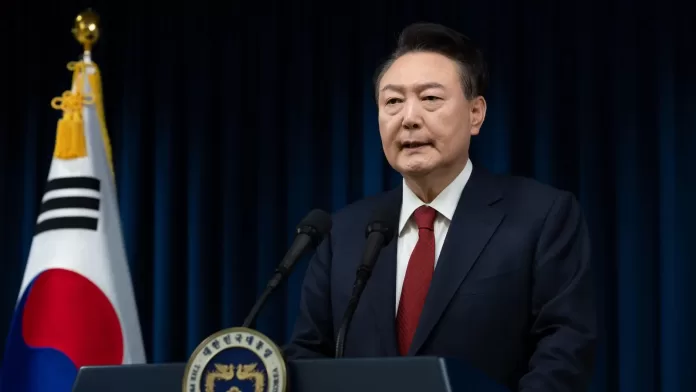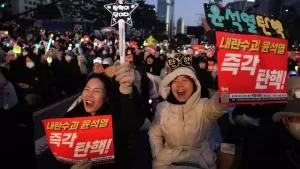South Korean authorities have imposed an overseas travel ban on President Yoon Suk Yeol as prosecutors consider potential insurrection charges related to his controversial attempt to impose martial law last week.
This marks a significant escalation in the aftermath of the failed martial law order that saw special forces dispatched to parliament in an effort to suppress opposition.
The decree was rescinded after lawmakers rejected it, sparking widespread protests across the country.
The decision to ban President Yoon from leaving the country was confirmed by the Ministry of Justice on Monday.
President Yoon is the first sitting South Korean president to face such a restriction.
The travel ban is part of an ongoing investigation into Yoon’s role in last week’s events, with prosecutors considering charges of insurrection.
Yoon narrowly survived an impeachment motion over the weekend after MPs from his ruling People Power Party (PPP) walked out of parliament, depriving the motion of the necessary two-thirds majority.
PPP members stated that they had chosen to abstain from voting after Yoon agreed to shorten his term and avoid involvement in both domestic and foreign affairs. However, the opposition Democratic Party, which holds a majority in parliament, condemned the agreement.
Floor leader Park Chan-dae described it as “an illegal, unconstitutional second insurrection and a second coup.”
Tens of thousands of South Koreans have taken to the streets to protest Yoon’s martial law attempt, demanding his resignation or impeachment. The protests have continued despite the failed impeachment vote, signaling growing discontent with Yoon’s leadership.
In response to the martial law declaration, former Defence Minister Kim Yong-hyun, who reportedly proposed the declaration, was arrested on Sunday. He had resigned earlier in the week, apologizing for his actions and taking “full responsibility.”
Other key figures involved in the martial law order, including Defence Counterintelligence Commander Yeo In-hyung and Army Chief of Staff Park An-su, have also had travel bans imposed on them.
READ ALSO: Anti-corruption group challenges NNPCL to clarify alleged fuel export from Port harcourt refinery
On Saturday, Yoon publicly apologized for the chaos caused by his attempt to declare martial law, admitting that his actions had caused anxiety and inconvenience to the citizens of South Korea.
“This emergency martial law declaration stemmed from my desperation as the ultimate responsible party for state affairs,” Yoon said in a two-minute address.
The scandal deepened when Colonel Kim Hyun-tae, commander of South Korea’s 707 Special Task Force, publicly apologized for ordering his troops to storm parliament. He admitted his orders had placed the soldiers in “grave danger” and called himself an “incompetent and irresponsible commander.”
Kim also criticized former Defense Minister Kim Yong-hyun for “exploiting” the soldiers during the chaotic operation. “I ordered the deployment to the National Assembly.
As the on-site commander for the 197 troops involved, I was the first to arrive by a helicopter. I instructed them to seal the building, engage in physical confrontations at the front and rear gates, break windows, and enter the premises,” Kim said.
“If such orders had been given in combat, everyone would have died,” he added. “These troops are the most tragic victims of this situation. They are not guilty. Their only fault lies in following the orders of an incompetent commander. Please forgive them.”
In addition to the travel bans imposed on President Yoon, former Defence Minister Kim Yong-hyun, ex-Interior Minister Lee Sang-min, and other key military figures have been prohibited from leaving the country as investigations continue.
Despite his controversial actions, Yoon has remained in office, although his political future remains uncertain. The impeachment motion against him failed, but the opposition has vowed to continue their efforts to oust him.
On Monday, Democratic Party leader Lee Jae-myung stated that another impeachment vote would take place on Saturday. Huge crowds are expected to gather again outside the National Assembly to show their discontent.
Yoon’s approval rating has plummeted to a historic low of just 11 percent, according to a recent Gallup poll, adding to the pressure on the embattled leader.
Despite the political turmoil, Yoon has not stepped down, stating that he would leave decisions about his future in the hands of his party.
The situation has left South Korea in a precarious position, with a potential power vacuum looming.
While the Defence Ministry has confirmed that Yoon remains in control of the country’s security apparatus, including its military, legal experts have raised concerns over the constitutional validity of Yoon’s actions and his potential power transfer to the prime minister and party officials.
Kim Hae-won, a constitutional law professor at Pusan National University Law School, described the situation as “an unconstitutional soft coup,” emphasizing that any changes in presidential duties must follow the procedures outlined in South Korea’s constitution, including impeachment.
“If there are issues with the president, there are ways laid out in the constitution such as suspending the president from his duties, and then move on to proceedings set out in the constitution, such as impeachment,” Kim said.
The opposition has made clear that they will continue to challenge Yoon’s presidency through legal and political channels.
Lee Jae-myung stated that another impeachment vote would be held on Saturday, and huge crowds are expected to gather again outside the National Assembly building.


